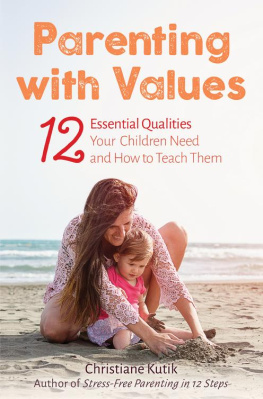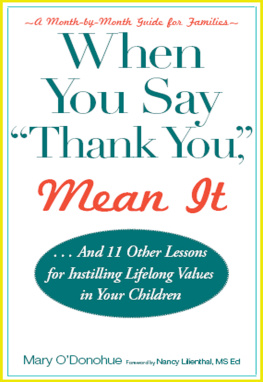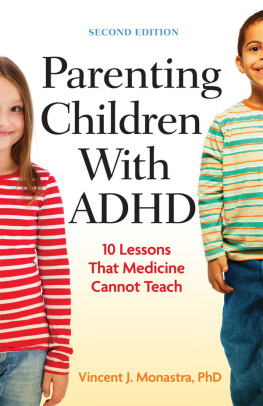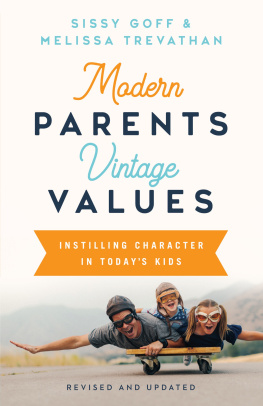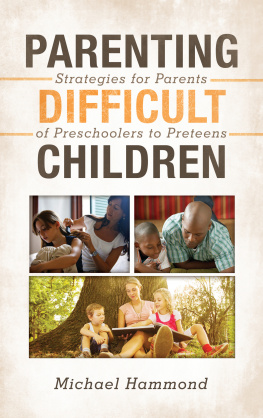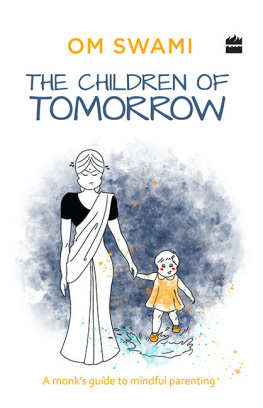In our modern world of myriad possibilities, there is much to be thankful for: plentiful food, advanced technology and excellent healthcare, to name but a few. For our children, the world is at their fingertips: there are hundreds of TV channels, the entire internet to explore, and countless forms of entertainment. These things certainly keep children occupied and we might tell ourselves that they are lucky to have so many advantages. Yet this fast-paced modern world has its downsides too, and it is easy to become overwhelmed by the demands of our busy lives and lose sight of what is really important to ourselves and to our children. Take a step back, for a moment, and ask: what kind of parents do we really want to be, and what do our children really need from us?
There are things that will always be important to children, whether they realise it or not. Children will always want to feel secure: to know that they are valued and have a place in the world. Children will always appreciate independence: being encouraged to do things for themselves and joyfully finding out that they can. Children will always love it when their parents do nurturing things with them: when they take the time to listen to them or to explore the worlds small miracles together.
Above all, children need warm-hearted attentiveness from us. They need us to show them the values by which they will best live their lives: self-respect, truthfulness and a real interest in the world. It is this sense of being fully present, of living a full life and of leading by example that is really important to raising our children not giving them lots of material things that might entertain them for a little while but ultimately leave them unfulfilled.
The challenge for us as parents while bringing up our children is to break away from the busy modern world, engage our hearts and embrace what is truly important in life. I believe there are fundamental values that all children need, and we can give these to them simply by living those values every day ourselves.
My hope is that this book will inspire you to embrace parenting with values and show how, through small actions, we can enliven and enthuse our children and help them spread their wings. Try living these values, and watch the young eyes in your household shine with humour and delight.
A six-year-old boy sitting next to his father suddenly asks him out of the blue, There are more good people than bad people, arent there, Dad?
His father looks thoughtful for a moment, then replies warmly, Yes, there are. And do you know, every day moments come when you and I can make life better!
In current-day parenting, we can find ourselves focusing on behaviours we want or dont want from our children, and skills we think they need to develop. Considering values might seem a little out of step with the modern world. Yet family life and our relationships with children are necessarily heavily laden with our values, for good or ill. As parents and caregivers, we are always demonstrating ways of being in the world with others and within ourselves. We are helping children to grow as emotional and moral beings. So I would encourage thinking about what might seem an old-fashioned idea: the development of character. Our childrens wellbeing is dependent on the growth and learning not just of body and mind, but also of the heart.
We can all take small actions every day to make life kinder and richer, starting with considering how we ourselves behave towards, and how we communicate with, our children. Commands like, Dont tell lies!, Eat nicely! and Dont swear! are certainly direct, but they are usually less effective than modelling good behaviour for children ourselves. We can make sure we speak truthfully. We can show our good manners. We can make sure we dont swear.
We can all try to take more care. None of us is perfect, but we can take notice of our own faults and try to remedy them. This is an important example to set for children: that character, and our hearts, can develop if we take care of them.
It might be uncomfortable to witness our children reflecting our flaws back at us, but we can certainly learn from the experience. As Goethe said, A growing person will always be grateful. Remember, as parents we are still growing too, and we learn a great deal when we closely observe the natural, warm-hearted impulses children bring with them into the world.
Heart to heart
Take a moment to notice how much little children love sharing. All infants, to begin with, have this wonderful quality. But we adults can often unintentionally hinder it. Does this scene sound familiar?
A father hands his daughter a piece of apple. The little girl takes it, bites off a piece, then offers the rest back to her father so he can have a bite too.
But rather than sharing, he is frustrated. No, he says. Eat up!
It is natural to want our children to be nourished and to eat the food we give them; indeed, in every way, we want them to have what they need. Giving our children things that are just for you might seem like the best way to parent and the best way to please them. But what we see as generosity and nurturing can suppress childrens natural warmth of heart.
The little girl who wanted her father to have a piece of apple might keep trying for a while to offer things she has, but if she is only ever rebuffed eventually she will assume her gifts are not wanted and she will stop. Yet children long to be taken seriously by grown-ups. How much better would it be to accept the gift given with such generosity of spirit and to encourage this impulse in our children?
Smiling is infectious
Children reflect genuine, vivid joyfulness when we really see them, when they sense our warm smile, for no particular reason, shining upon them. Smiling makes an immediate connection between people and warms our hearts and thats what the world needs. Smiling is infectious: when we give, it comes straight back.
A smile is enough
Over one hundred studies have shown that rewarding childrens values by giving them material things will weaken internal motivation. One of these studies, with two groups of infants aged twenty months, involved the adult participant clearing her desk and dropping a pencil. In the first group, the children who picked it up and gave it back to her were each given a small reward, while in the second they received a friendly smile. The researchers found that children rewarded materially soon lost the spontaneous urge to help, the children who received a smile did not. The smile affirmed the relationship the children were trying to build.
Nowadays, there are so many toys and technologies that can give children fleeting pleasure, and it is natural for us to want our children to have whatever they desire. However, the risks of using these as rewards for natural impulses should be heeded. Lets cherish our childrens innate capacity for generosity and loving assistance, rather than feeling we need to reward them for it with more than love and smiles.
A warm greeting
Every encounter with our children has the potential for joy. This is why greeting them first thing in the morning is so important. Share a hug and say their name. Showing that we are happy to see our children gets the day started on a hopeful footing, and it only takes a couple of seconds. The same is true of giving a warm farewell when it is time to go to school or to nursery. These small gestures strengthen our children emotionally and make them feel loved.

